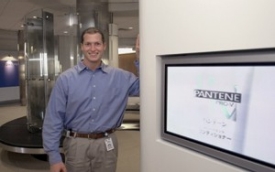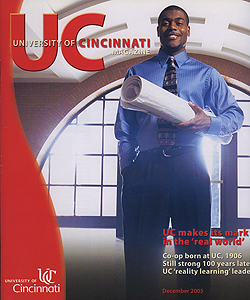CO-OP: crucial to industry

Dan Jackson, Eng '04, spent five co-op quarters with Procter & Gamble handling an array of tasks from facilities management to brand management.
The benefit to UC students from gaining access to more than 1,500 co-op employers around the world is obvious. But what do those employers think of their partnership with the university? From their perspective, the arrangement appears mutually beneficial. In fact, some of Cincinnati's biggest employers rely heavily on UC's pool of co-op talent.
"UC is by far our largest supplier of co-ops. They do great work. They gain a wealth of practical experience working with our engineering, manufacturing and product-support organizations. A large percentage of our co-ops are hired for our entry-level leadership programs or other direct-hire positions. We look forward to maintaining our co-op pipeline and the relationship GE has with UC."
Karen Clark manages the early identification talent program for GE Aviation. GE is by far UC's largest co-op employer, averaging more than 200 placements a year from the colleges of engineering, business and applied science.
"P&G's intern and co-op programs are an excellent way for us to reach outstanding students early in their college careers -- this is especially important in an increasingly competitive job market. These students have an opportunity to immerse in P&G's culture, learn about our business operations and grow by doing very challenging, project-oriented work. Oftentimes, our co-ops and internships lead to full-time employment opportunities where we find these new hires get off to a very fast start due to their previous P&G experience."
John Mang, Eng '88, is general manager of global fabric and home-care new-business development at Procter & Gamble. He also leads the UC recruiting team at P&G, which hires about 70 UC co-ops a year to work in engineering, finance, marketing, IT, design, sales, public relations and more.
"We are really fortunate as a company to have a partner like UC. Our co-ops don't just do tests. They actually run the lab. So they are not expected to just sit behind a piece of equipment and run a test. We want to make sure that we grow them so that when they come out they are ready to produce that first day. They are very productive as co-ops, but we want them to be independent when they hit the marketplace.
"It is fun and motivating to have our co-ops around. Plus they are talented and productive. In a co-op, you are really supposed to still be learning. Fortunately you get a little revenue out of it. But we need to make sure that we remember that we are teachers.
"I can't speak any more positively about UC's co-op program. We benefit a lot from this relationship."
Sam Privitera is vice president of product development for Atricure, which develops, produces and markets medical devices. The firm employs several co-ops each year from biomedical and mechanical engineering. Those co-ops have led to several full-time positions for UC alumni.
"Co-op creates a win-win situation for both employers and students. Students get the opportunity to participate in some of the daily activities of someone in the field and apply the knowledge they have gained from their studies. This experience is invaluable to either confirm or redirect their career path.
"For an employer, they gain the assistance of bright, eager-to-learn individuals and ultimately have the opportunity for an extended interview."
Jill Peddenpohl hires and supervises UC accounting students from the College of Business in Milacron's corporate office. She points out that Milacron, then Cincinnati Milling Machine, participated in the first cooperative education class in 1906.
"The co-op experience opens doors that otherwise may not be opened to students. In our business, we have competitors, and you just wouldn't let people come in and see how we operate. But if you are a co-op, you get to see how the company operates. You get to hear the decisions that go into marketing and business planning. You get to see behind the curtain.
"A number of the employees that are here today in high positions are former UC co-ops. As an employer, you are making a commitment to students and the university to help develop young people. That is kind of the altruistic side of it. The other side of it is an opportunity to have employees that are extremely eager and willing to work and bring new ideas to the company.
"We have always asked the co-ops, What are the new technologies? What's happening down at the school that maybe we are a little insulated from because we do the work the way we have always done it?"
Rob Adams, DAAP '95, is a senior project manager for Landrum and Brown, an airport environmental planning firm. Adams landed the job with his firm a decade ago after spending four quarters there as an urban planning co-op. He has now come full circle and hires UC co-ops from DAAP.
"When I'm looking at hiring engineers or staff managers, those who have co-op experience stand out. The competency level of UC co-ops is phenomenal. They are able to make significant contributions that far outweigh their compensation. That is how I justify it on the corporate level.
"On the personal level, I know what I got out of co-op. So if I can provide those opportunities to others, I'll do it."
Karl Zimmer, Eng '99, is plant manager at General Cable in Jackson, Tenn. The 29-year-old industrial engineering grad and former international co-op, runs a plant of 300 employees and a $60 million budget. He now employs several UC co-ops from the College of Engineering.
"The gem of the co-op is that you are putting students into the work force that can be productive workers concurrent with the staff that's there. I think that's why employers really like UC co-ops. They understand the more professional relevance of what they do, the engineering and the processes.
"Those kids are coming out with the skills that work in our world. We just have that pipeline of UC coming in. You always hear about being an alum and school pride and all that. But it is really just the pool of talent at UC and the ease of dealing with Professional Practice."
Matt Day, DAAP '03, is a designer with Astro Studios, a product design studio in San Francisco. Day's design concept for the new Microsoft Xbox gaming system was chosen for development. With two full-time designers and two co-ops, UC makes up about one fourth of Astro's staff.

